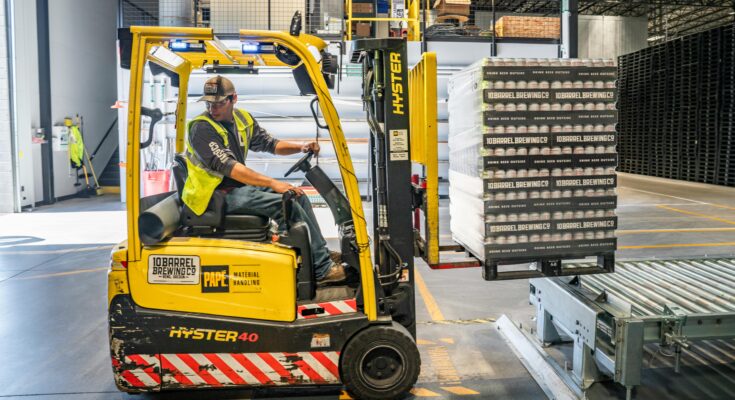Warehouse jobs are a crucial part of the supply chain, serving as the backbone of industries that require efficient storage, distribution, and management of goods. With the continuous rise of e-commerce and logistics, the demand for warehouse workers in the United States has surged. This article explores the various aspects of warehouse jobs in the USA, providing detailed information about the types of jobs available, qualifications, pay scales, work environments, career growth, and trends in the industry.
Why Warehouse Jobs are in High Demand
The United States economy is heavily dependent on its logistics and distribution networks. With the expansion of e-commerce giants like Amazon and Walmart, and the growth of third-party logistics companies (3PLs), warehouses have become essential to getting goods from manufacturers to consumers. As businesses strive for faster deliveries and efficient inventory management, they require a significant workforce to manage the operations within these massive storage hubs.
The demand for warehouse workers has been amplified by consumer demand for same-day or next-day delivery, creating the need for round-the-clock warehouse operations. Additionally, automation in warehouses, though it streamlines some tasks, has not eliminated the need for human labor. Instead, it has created new roles focused on maintaining and overseeing automated systems, alongside traditional warehouse functions.
Types of Warehouse Jobs
Warehouse jobs are diverse, ranging from entry-level positions to roles requiring technical expertise. Below are some of the most common types of warehouse positions available in the USA:
1. Warehouse Associate
A warehouse associate typically handles the most basic tasks such as receiving, storing, and distributing goods. Responsibilities may include picking items for orders, packing products, and operating machinery such as forklifts. This role often requires little to no previous experience and serves as an entry-level position.
2. Forklift Operator
Forklift operators are responsible for moving large pallets of goods around the warehouse. They must be skilled in using industrial equipment, such as forklifts, to transport goods safely and efficiently. Certification is usually required for this role, which ensures compliance with safety standards.
3. Warehouse Manager
Warehouse managers oversee the entire operation, ensuring that goods are received, stored, and shipped in an efficient manner. They manage warehouse staff, ensure compliance with safety regulations, and implement strategies to improve productivity. A background in logistics or supply chain management is often required for this role.
4. Inventory Control Specialist
An inventory control specialist is responsible for managing and tracking warehouse stock levels. This role requires a keen eye for detail, as well as proficiency in inventory management software to ensure that the warehouse operates with accuracy and efficiency.
5. Material Handler
Material handlers move products throughout the warehouse and assist with loading and unloading trucks. They often work closely with forklift operators and other warehouse associates to ensure that goods are moved and stored efficiently.
6. Shipping and Receiving Clerk
Shipping and receiving clerks handle the processing of incoming and outgoing shipments. They ensure that orders are fulfilled correctly, create shipping labels, and maintain records of shipments. These clerks may also inspect incoming goods for quality control purposes.
7. Warehouse Technician
Warehouse technicians are responsible for the technical upkeep of warehouse equipment and systems. This role often involves troubleshooting and repairing machinery, managing automated systems, and ensuring that the technological infrastructure of the warehouse runs smoothly.
Qualifications for Warehouse Jobs
The qualifications for warehouse jobs vary based on the position. Entry-level jobs such as warehouse associate or material handler generally do not require formal education, though a high school diploma or GED may be preferred. Physical stamina and the ability to lift heavy objects are typically the main requirements for these roles.
For more advanced positions like forklift operator, inventory control specialist, or warehouse manager, additional qualifications may be necessary. For example, forklift operators need certification, and warehouse managers often require a background in logistics or supply chain management, along with years of experience in a supervisory role.
Warehouse jobs also frequently require a familiarity with technology, especially for roles involving automated systems. Experience with warehouse management systems (WMS) and other inventory tracking software is increasingly becoming a necessary skill.
Working Conditions in a Warehouse
Warehouse environments can be fast-paced, physically demanding, and sometimes hazardous if proper safety measures are not followed. Workers may be required to lift heavy objects, operate machinery, and spend long hours on their feet. The warehouse environment itself may be cold (in refrigerated warehouses) or hot, depending on the nature of the goods being stored and the location of the facility.
Many warehouses operate around the clock, offering shifts during the day, night, and even weekends. This can be ideal for workers who need flexibility in their work schedule. However, shift work may also mean long hours and working overnight, which can be challenging for some employees.
Safety is a major priority in warehouse jobs. Employers are required by law to provide a safe working environment and ensure workers are trained on the proper use of equipment. Workers are expected to adhere to safety guidelines, such as wearing personal protective equipment (PPE) and following proper lifting techniques to avoid injuries.
Pay Scale for Warehouse Jobs
Salaries for warehouse jobs vary depending on the position, location, and experience level. According to data from the U.S. Bureau of Labor Statistics (BLS), as of 2023, the median hourly wage for warehouse workers was around $16.00 per hour, which can amount to roughly $33,280 annually for full-time workers.
Below are some average wages for various warehouse positions:
- Warehouse Associate: $14 – $18 per hour
- Forklift Operator: $16 – $21 per hour
- Inventory Control Specialist: $16 – $22 per hour
- Shipping and Receiving Clerk: $15 – $20 per hour
- Warehouse Manager: $55,000 – $75,000 annually
Wages can vary significantly by region. For example, warehouse workers in metropolitan areas or regions with high costs of living, such as California or New York, may earn more than workers in other parts of the country.
Career Growth and Opportunities
Warehouse jobs offer ample opportunities for career growth, especially for individuals willing to gain experience and pursue additional training. Entry-level positions such as warehouse associate can lead to more advanced roles, such as forklift operator or inventory control specialist, with the right training and experience.
Many companies offer internal training programs to help employees advance within the company. Forklift certification, safety training, and proficiency in warehouse management systems can open the door to supervisory positions and management roles.
Warehouse jobs can also serve as a gateway to other careers in logistics and supply chain management. With the right qualifications and experience, workers can move into higher-paying roles such as warehouse manager, logistics coordinator, or supply chain analyst.
Trends in Warehouse Employment
The warehouse industry in the USA is evolving rapidly, driven by changes in consumer behavior, technological advancements, and global supply chain dynamics. Some key trends shaping warehouse jobs include:
Automation and Robotics
While automation is streamlining many warehouse tasks, it is not necessarily reducing the need for human labor. Instead, it is shifting the type of work available. Jobs that require overseeing automated systems, maintaining robots, and managing data from these systems are becoming more prevalent.
E-commerce Growth
The boom in e-commerce has led to an increased demand for warehouse space and workers. Companies like Amazon are continuously expanding their warehouse networks to keep up with customer demand, leading to job growth in fulfillment centers across the country.
Focus on Sustainability
More warehouses are adopting environmentally friendly practices, including energy-efficient lighting, solar power, and recycling programs. As a result, warehouse jobs may increasingly involve sustainability-related tasks, such as managing waste reduction initiatives or optimizing energy usage.
Gig and Contract Work
The gig economy is influencing warehouse jobs, with some companies offering short-term or contract-based positions. This allows workers flexibility but may also lead to less job security and fewer benefits than full-time employment.
Conclusion
Warehouse jobs in the USA provide an essential service in a rapidly growing industry. Whether you’re seeking entry-level work or a career in logistics management, warehouse positions offer diverse opportunities with competitive pay, career growth potential, and job stability. With the rise of automation and e-commerce, warehouse workers are poised to play a crucial role in the future of supply chain management, ensuring that goods are stored, managed, and delivered efficiently.



